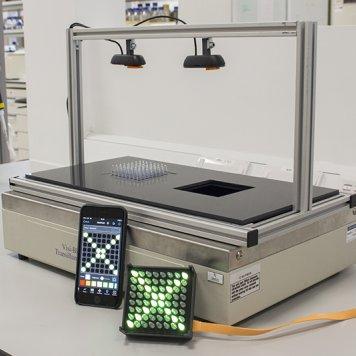
Submitted by Administrator on Tue, 16/05/2017 - 13:35
Cell-Free Tech is a brand new start up company specialising in giving people the ability to do biological research, without the need for expensive tools and infrastructure. Based at the Microbiology Department of the University College Cork, Cell-free Tech is part of RebelBio, an accelerator programme that helps life sciences innovators, academics, biomakers and citizen scientists to change the world with biology.
Synthetic Biology SRI member Thomas Meany (formerly of the Department of Plant Sciences) has helped found an exciting new startup company based on making cell-free technology more accessible. Meany founded the startup this year in collaboration with Ian McDermott (Chief Scientific Officer Cell-Free Tech), and together they have been awarded funding from the accelerator programme RebelBio and SOSV (a venture capital and investment management firm)to take cell-free technology out of the lab and into the world.
Originally a physicist by trade, Meany undertook a OpenPlant/Wellcome Trust ISSF Interdisciplinary Fellowship, co-supervised in the Haseloff and Hall groups (Department of Plant Sciences and Department of Chemical Engineering and Biotechnology respectively), where he applied his computing and engineering skills to the field of synthetic biology. It was through his involvement in the SynBio SRI activities around cell-free systems, such as our recent workshop ‘Programmable biology in the test tube’, that he realised the potential of cell free systems to provide exciting and simple tools with which to do biological research.
In vitro or cell-free synthetic biology uses cell extracts rather than whole cells, programming them with DNA to produce chemicals or encode logic circuits that respond to their environment. The technology can be used to create vital biomolecules like insulin, or to generate stunning coloured, glow in the dark proteins. Since it doesn’t involve genetic engineering or extensive resources, cell-free technology can be used without the need for expensive facilities or infrastructure. Meany became increasingly fascinated by the concept: “I just loved the idea of doing biology anywhere, being able to make and create things with biology on a tabletop is fascinating.”
It was around this time Meany collaborated with SRI Steering Committee Member Helene Steiner (Royal College of Art and Microsoft Research Cambridge) on a series of cell-free workshops for the Royal College of Art (RCA) Biodesign Challenge, aimed at making synthetic biology tools accessible to art and design students. It was through these events it became clear there was a great deal of interest in cell-free systems among the public. However, a recurring problem was that there was little scope for people to get involved, due to the lack of availability of affordable tools. Meany realised the potential for providing cheap, effective materials and after meeting Ian McDermott, a biochemist with experience in founding a business startup, they realised they think the same way. “Biology today is like computing in the late 1980s, simply awaiting an explosion of innovation. Technologies are developing faster than ever but some key platform technologies are still missing. People need to be able to access biology at an affordable price, in their own homes or workplaces and without enormous infrastructure” - explained Meany.
After communicating their vision to Bill Liao (Founder of RebelBio and SOSV investment partner) during a RebelBio conference, it was clear that their passion for cell-free technology was shared. Meany and McDermott left their University roles and with investment from RebelBio and SOSV, the team have set about producing the first publicly available low cost bio-prototyping kit at large scale, while directly reaching consumers through active market research. The kits will include a collection of 50 tubes containing individual cell-free extract alongside a set of plasmids that can be added to the extracts to produce colours, fluorescence and odours. Meany hopes universities, students, designers and makers or hobbyists from all backgrounds will be interested. “We are building the platform technology that will allow innovators from all backgrounds to engineer the materials of the future. Our hope is that the community will build on our initial projects to create and share amazing ideas of their own. We want to see biosensors, paper diagnostics and open-source insulin produced using our kits!” - Meany.
If you would like to contact Cell-free Tech to find out more or to get involved, please get in touch. They are eager to work with members of the Cambridge synthetic biology community. For more information on Cell-Free Tech, please click here.
If you are interested in learning more about cell-free technology, the SynBio SRI is currently running a series of events in this area, such as the OpenPlant Forum, OpenPlant Fund, and training workshops. For more information about these initiatives and upcoming events, please click here.

